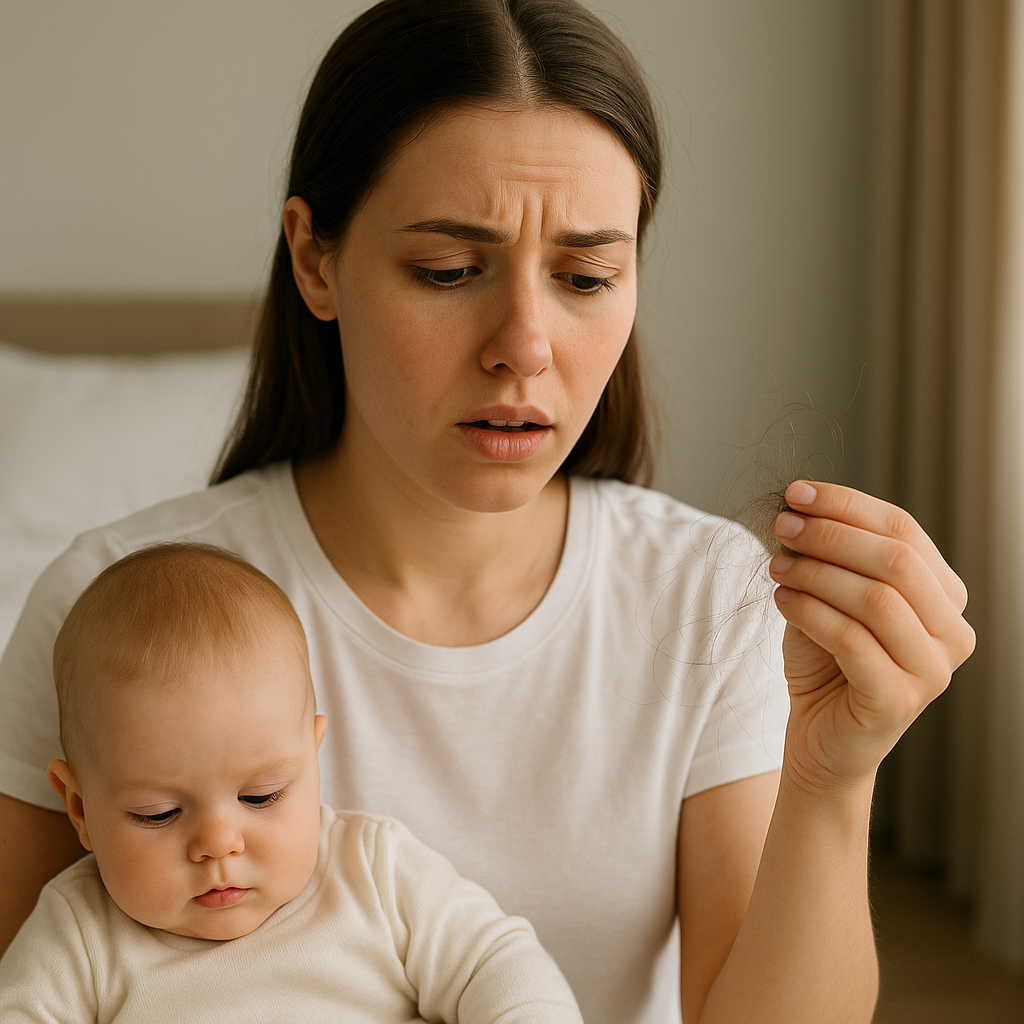
Postpartum Hair Loss: What Causes It and How to Regrow Your Hair Naturally
Share
Why Is My Hair Falling Out After Pregnancy?
If you've recently had a baby and noticed handfuls of hair in the shower, you're not alone. Postpartum hair loss, or postpartum telogen effluvium, affects up to 90% of new mothers. It can start around 2–4 months after giving birth and often peaks by month 4 or 5.
But don’t panic—this isn’t permanent hair loss. It’s caused by a sudden drop in estrogen levels after pregnancy, which shocks your hair follicles into a resting (telogen) phase, leading to excess shedding. Add sleep deprivation, stress, nutrient depletion, and hormonal shifts—and your scalp gets the message to hit pause on growth.
The Science Behind Postpartum Shedding
During pregnancy, high estrogen levels keep your hair in the growth phase (anagen) longer, making it look fuller, shinier, and thicker. But after birth:
-
Estrogen drops rapidly, releasing those hairs into the shedding phase all at once.
-
Cortisol (stress hormone) may spike, which shrinks follicles and extends shedding.
-
Nutritional reserves (iron, biotin, zinc) are depleted, impairing hair growth.
-
Thyroid imbalances (like postpartum thyroiditis) may worsen shedding further.
-
DHT (a potent androgen) rises postpartum and can trigger follicle shrinkage.
These factors combine into the perfect storm for excessive hair loss—and for many women, it’s more than just cosmetic. It hits your confidence, your sense of identity, and your overall postpartum wellbeing.
How Long Does Postpartum Hair Loss Last?
Typically, postpartum hair loss is temporary, resolving within 6–12 months. However, for some women, especially those with:
-
Underlying thyroid conditions
-
Nutrient deficiencies
-
High chronic stress
-
PCOS or hormonal imbalances
…it can persist or worsen, leading to long-term thinning and reduced volume.
Natural Ways to Regrow Hair After Pregnancy
Here’s the good news: you can speed up recovery with a science-backed approach targeting the real root causes.
1. Replenish Nutrients
Your body needs raw materials to regrow hair:
-
Biotin, B-complex vitamins, and Zinc — Support follicle energy and keratin production.
-
L-Lysine & Marine Collagen — Boost structural strength from the inside out.
-
Vitamin C & Silica (Horsetail Extract) — Help collagen synthesis and reduce strand breakage.
-
Iodine & Selenium (Kelp) — Support healthy thyroid function, essential post-birth.
StrandScience™ includes all these in bioavailable, research-backed forms.
2. Block DHT (Without Hormones)
Natural DHT blockers like:
-
Saw Palmetto Extract (shown to inhibit 5-alpha reductase)
-
Pumpkin Seed Oil (rich in zinc & fatty acids)
…can reduce hormone-related follicle shrinkage—without affecting breastfeeding.
These actives are featured in the upcoming Strand Science™ Oil Serum.
3. Lower Stress & Cortisol
Adaptogens like:
-
Ashwagandha KSM-66®
-
Rhodiola Rosea
…are clinically shown to reduce cortisol and support hormonal balance—key for reducing stress-related shedding.
Included in every StrandScience™ capsule for full-body resilience.
4. Support the Gut-Skin Axis
Postpartum antibiotics, sleep loss, and stress disrupt the gut microbiome, which can:
-
Drive scalp inflammation
-
Block nutrient absorption
-
Affect immune-triggered hair loss
Probiotics like Lactobacillus and Bifidobacterium, plus inulin (a prebiotic), help restore gut health—improving scalp conditions and absorption.
Why StrandScience™ Is the Postpartum Hero You Need
Unlike generic hair vitamins, StrandScience™ is a 360° hair growth system Co - designed by Jennifer who lived this journey twice with no help.
Every capsule contains:
-
20+ science-backed ingredients
-
No synthetic fillers or stearates
-
UK-made to GMP & BRCGS AA standards
-
Backed by real clinical studies
-
Safe for new mums (always check with your GP if breastfeeding)
We’ve combined stress support, follicle nutrition, hormone balancing, and gut health all in one daily capsule.
When to See a Doctor
If your hair loss is:
-
Lasting longer than 12 months
-
Accompanied by fatigue, cold hands, or weight changes
-
Causing visible bald patches
…it could signal thyroid dysfunction or other health issues. A simple blood test can rule this out.
Final Thoughts: You’re Not Alone—And You’re Not Powerless
Hair loss after pregnancy is common, but that doesn’t make it easy. You deserve to feel like you again—and you don’t have to wait 12 months for that confidence to return.
With the right support, your hair can bounce back stronger than ever.
Backed by Science. Built for Confidence.
Product currently sold out due to high demand. Orders reopen soon!
